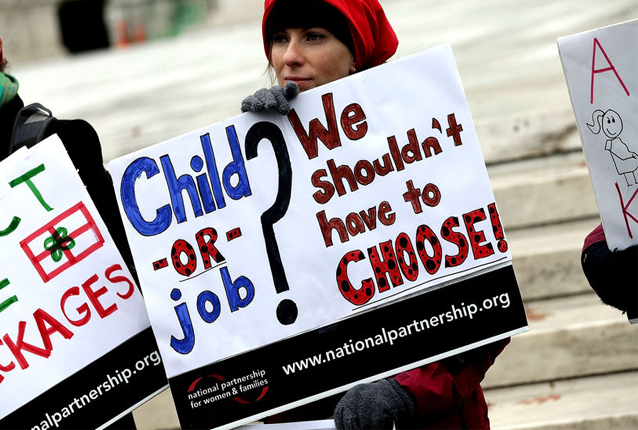Last Labor Day, the movement to ensure that everyone has the ability to take paid sick leave scored a major victory when President Obama signed an executive order to provide employees of federal contractors with paid time for personal or family health needs.
The executive order itself will have a huge impact, potentially expanding access to paid sick time for hundreds of thousands of individuals. For families trying to balance earning a living with taking care of themselves and others, this is a life-changer.
Now, the U.S. Department of Labor (DOL) is poised to set another standard that further demonstrates the ways the federal government serves as one of our country’s model employers. The DOL is proposing rules that will not only determine how many people are covered by family leave, but also how “family” is defined. So why does this matter? Don’t we all know what family means?
How broadly or narrowly we define family puts limits on how individuals are able to use their leave. If family is defined narrowly by listing types of biological or legal relationships, it will exclude some of the ways we care for each other and impact our contributions to the stability of our communities. For example, will someone be able to use paid leave to care for their extended family members? What about to take an elderly neighbor living alone to a doctor’s appointment? Or to care for a transgender youth who is staying with them after having been kicked out by their own biological or foster family? The definition the DOL is proposing will allow for the most inclusive application of the policy and better reflects the reality of today’s families. This “blood or affinity” standard is actually not new. The federal government has been using it in its own personnel policies for nearly 50 years.
Historically, communities that have been excluded from policies in our country have found ways to take care of their families despite the lack of institutional support. More than 18 percent of Americans – 57 million people – live in multigenerational family households. And this figure is even higher among communities of color; about 25 percent of Latino and Black Americans and 27 percent of Asian Americans live in a multigenerational household. According to the U.S. Census Bureau, about 20 percent of households with children include nonrelatives or family members other than a parent or sibling. And 4.3 million children live with an extended relative – a figure that doesn’t even include parents, siblings, children, grandparents, aunts, uncles, nephews, nieces, brothers-in-law and sisters-in-law).
The DOL’s proposed family definition is especially important to LGBTQ Americans, who have been shown to rely more on close friends, or “chosen family,” in an emergency than their non-LGBT peers. LGBTQ-identified older adults in the United States are twice as likely as non-LGBTQ-identified seniors to live alone and more than four times as likely to be childless, relying less on biological family support later in life. Similarly, Americans living with HIV and AIDS often have a network of friends who play critically important care-giving roles.
While the resiliency of marginalized communities through adversity is a strength that many families lean on, policies that limit who can be considered family perpetuate systems of inequality that compromise every family’s opportunities to thrive. By including this inclusive language in the paid sick leave rule for federal contractors, the DOL is solidifying an important standard and strengthening a growing movement to update the definition of family beyond current cultural and policy constraints.
Make sure the Department of Labor knows you support these strong protections for ALL kinds of families. Submit a comment today!





It is always good to read the stipulations and what is required to do ones work well and be reliable. One can always gamble with a job and her resources, but should never gamble with a life!